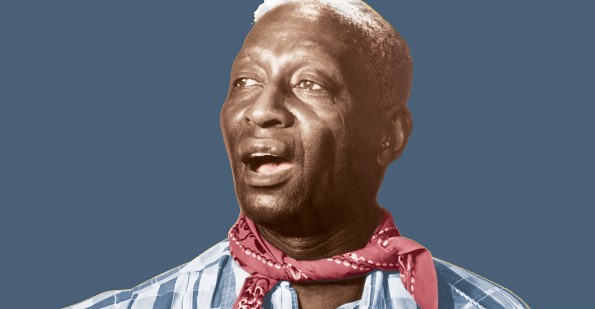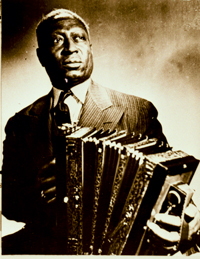The Blues and Folk Legend of the South
Take a walk down Texas Street and you’ll come face to face with a bronze statue of Huddie “Lead Belly” Ledbetter and his famous 12-string guitar Stella. No one is more emblematic of the early southern folk music movement than this singer, songwriter and prolific guitarist. Most known for hits such as “Goodnight, Irene,” “The Midnight Special” and “Cotton Fields,” Ledbetter’s music laid the groundwork for the folk genre that influenced generations of musicians after his untimely death.
A Hometown Start
This folk-blues legend hailed from Mooringsport and spent his early life travelling across the South, absorbing its culture and assimilating a vast repertoire of musical styles. But Shreveport is where he began to shape his career.
Ledbetter took notes from popular artists who flocked to Fannin Street, a street lined with brothels and bars in the notorious red light district of St. Paul’s Bottoms, now known as Ledbetter Heights. He loved the atmosphere of Fannin Street so much, he memorialized it in song. He performed for audiences there, developing his own voice and cultivating a small following before moving to Dallas with his wife.
From Unfortunate Circumstances Arises a Star
It was well known that Ledbetter sported a particularly volatile temper and spent a large part of his life in and out of prison. In December 1917, Ledbetter was found guilty of murder and sentenced to 20 years in prison. As the legend goes, he pleaded for his release in the form of a song and was granted a pardon only a few years into his sentence.
Five years later, he wound up in the Louisiana State Penitentiary, commonly referred to as Angola, this time for attempted homicide. This felony would lead to him being discovered by John and Alan Lomax, a father-son folklore duo who took a keen interest in Ledbetter’s unique style. They visited him frequently in prison, recording hundreds of songs within the span of a few short years.
In 1934, the Lomaxes petitioned Louisiana Governor Oscar Allen urgently requesting Ledbetter’s release. Included with the letter was a recording featuring his soon-to-be signature song, “Goodnight, Irene.” Again, he was to sing his way out of the penitentiary.
On the Road to Success
After his return to freedom, Ledbetter recorded dozens of blues songs that ultimately did poorly on the commercial market. It was only until after another run-in with the law that he began to gain recognition, this time in the budding folk scene in New York. The newly crowned King of the Twelve-String Guitar recorded for numerous record labels and performed tirelessly, still struggling to make a living.
Ledbetter was the first American country blues musician to earn fame in Europe, and in 1949, he began his first European tour starting with a trip to France. Unfortunately, it was not meant to be. Before the tour was over, Lead Belly fell ill with complications from late-stage ALS. He died later that year.
While Ledbetter enjoyed a moderate amount of fame during his lifetime, it wasn’t until after his death that his musical stylings gained greater popularity.
Drink Up at History on Tap
On March 24, the Shreveport Downtown Authority pairs history with alcohol with History on Tap. Tour the unique architecture of downtown while sipping beer and soaking in the culture. Drink up and learn a few fun facts about the city you live in.





